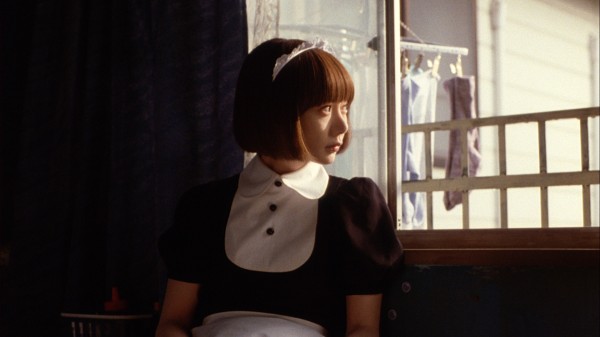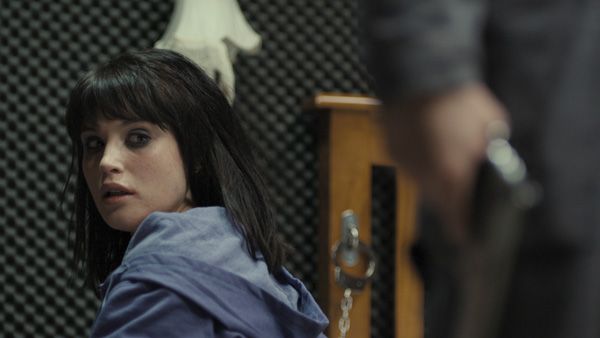[AIR DOLL]
DIR: Hirokazu Koreeda
CAST: Bae Doo-na, Arata, Itsuji Itao

I don’t care if you’re male or female, straight or gay, if, 45 minutes into Air Doll, you aren’t head over heels in love with Bae-Doo-na then, honestly, you and I have nothing to say to one another.
Hirokazu Koreeda’s fish out of water fantasy is about Nozomi (Bae), a sex doll who one day comes to life (as the movie has it she ‘finds a heart’) and, unbeknownst to her owner (Itao), she begins wandering the streets of what appears to be a small Japanese town where they live. Nozomi gets a job in a local video and dvd rental store, and her young co-worker (Arata) falls for her. The film then proceeds to follow Nozomi as she learns about the world and how finding a heart can be both wonderful and painful. From that summary it sounds like Air Doll could go one of two ways; seedy or sickly. That it doesn’t fall into either of those traps is partly thanks to a screenplay that is layered and intelligent, but in the main it’s down to Bae Doo-na.
Bae is a South Korean actress who first came to my attention as the girlfriend of Shin Ha-kyun’s character in Sympathy for Mr Vengeance. She had previously acted, impressively, in Japanese in the slight but entertaining Linda Linda Linda. Here she’s got a rather more challenging role than that of a high school student. There’s little to draw on for a character like Nozomi. Bae’s casting is the film’s masterstroke. I’ve previously described her as a Korean Audrey Hepburn, and never has that comparison been more apt than it is during Air Doll. Like Hepburn, Bae has something innate, a level of sweetness, goodness and charm that seems just to emanate from her whenever she’s on screen. As it did with Hepburn this can make her seem naïve, even childlike, and that’s what makes Bae so perfect as Nozomi.
Nozomi has to be a blank slate, but never be boring. As well as being rather irresistible, Bae happens to be a brilliant actress, and right from the off she’s wonderful as Nozomi. She takes in the world around her with such wide-eyed, childlike, glee that you can believe it’s first time she’s ever seen it. While this is fun for the first half hour or so after Nozomi comes to life, there are more layers to both the film and the performance, with Bae especially moving as she discovers what human life is like; the existence of birthdays, for instance, and of loneliness.
Air Doll has a bittersweet streak, but it’s largely a comedy, and a very funny one at that. Many of the laughs come from the fact that Nozomi knows so little of life. A couple of especially funny sequences deal with the fact that when she sees a woman with visible seams on her tights, Nozomi mistakes them for the moulding lines she has on her legs and arms. The scene in which she gives this bemused woman some make up, and tells her it will cover up the lines is both sweet and very, very funny. Because of the nature of its main character, Air Doll has quite a lot of nudity. Koreeda and Bae handle this beautifully. There’s, much to my surprise, nothing prurient about the film and its nudity, and though Nozomi is very childlike it is never uncomfortable or unnatural seeing her in that context, because the film has such an innocence about it.
This is Bae Doo-na’s film to the exclusion of all others. It’s not that the rest of the cast aren’t fine, Arata is especially good as the young video store clerk who instantly falls for Nozomi (and who could blame him) and Iato is teriffic in the pivotal scene in which Nozomi reveals that she’s now alive. The thing is that, good as their contributions are, they are simply outclassed by Bae. Even director Koreeda, though, his imagery is memorable and sometimes both witty and moving in and of itself, finds himself being upstaged because Bae is so good that it’s hard to take your eyes off her and notice the beautiful construction of his framing.
The only real problem with the film is that it begins to lose steam just a little towards the end. Trimming the 120 minute running time by perhaps a quarter of an hour, mostly from an overlong ending, which is the only time an otherwise sweet film strays into saccharine, would probably result in a tighter and even more rewarding experience. Some may find Air Doll aggressively quirky, but for me, for the most part, the tone is perfectly judged, which is quite a brilliant juggling act on the part of Hirokazu Koreeda. Make no mistake though, Air Doll is a confection and the fact that it tastes so very sweet is thanks almost entirely to its amazing lead performance.
THE DISAPPEARANCE OF ALICE CREED
DIR: J Blakeson
CAST: Gemma Arterton, Eddie Marsan, Martin Compston

British director J. Blakeson’s feature debut begins with one of the most striking sequences of the year, sadly it can’t maintain that level of quality throughout.
In silence, two men (Marsan and Compston) buy tools, locks, a bed, and other DIY items. In a shabby flat they block up the windows with boards, soundproof a room, bolt the new bed to the floor, and fix metal rings to the bedposts. Then they get in a van and kidnap Alice Creed (Arterton), bring her back to the flat, tie her to the bed and strip her. These first ten minutes of The Disappearance of Alice Creed are simply brilliant. There is an eerie calculation to everything these as yet unnamed men do, a disturbing dispassionate feeling about the whole thing and the fact that Blakeson has the entire sequence unfold in silence only makes it more horrifying. For its first half hour Alice Creed feels like an especially unpleasant and disquieting sort of exploitation film; Arterton is stripped and exposed to her kidnappers and the camera within minutes of her taking, and that’s about the most dignified thing that happens to her for a while. The banal process of keeping the victim confined but healthy is seen in some detail, and has a real impact because, like Henry: Portrait of a Serial Killer, which was surely an influence, Blakeson’s film implicates us in the horror unfolding before us. This isn’t a comfortable place to be. The first 30 minutes of this short film are skin-crawlingly difficult, but though it may be seen as a relief, when this passage of the film comes to an end, it instantly becomes less engaging.
A key character relationship, which I won’t spoil here, becomes clear at around the half hour mark. At that moment I saw the whole film, knew exactly how it was going to unfold, exactly where it would end. Much to my disappointment the film trod exactly the expected path, with me a mile ahead of its every step. This is a shame, because there’s plenty to recommend The Disappearance of Alice Creed, even outside of its opening half hour. Most notable are the excellent performances of Eddie Marsan and Martin Compston as the kidnappers. They are two sides of a corrupt coin; Marsan all force and bluster and Compston nervous, subjugated, but conniving. Two very different performances then, but each is equally powerful. Unfortunately Gemma Arterton lets the side down. Arterton is a beautiful girl, but on this evidence she’s not a great deal more than a pretty face. One character notes that fear can’t be convincingly acted, and Arterton often bears that out. Generally she does this by acting her socks off, she’s trying really hard, and that’s exactly the problem. Compston and Marsan are both very natural, but with Arterton you can always see the cogs turn, always catch her acting.
Despite a low budget, Blakeson and cinematographer Philipp Blaubach achieve a strong look for the film. It’s immediate and lo-fi, but never cheap or amateurish. Indeed in that first passage of the film the intimacy of Blakeson’s camera work, and the extensive close ups, add immensely to the effect the film has on its audience. Despite the fact that it doesn’t entirely work, The Disappearance of Alice Creed still represents a promising debut for Blakeson. Most of the film’s scenes work in and of themselves - a couple of lo-fi set pieces involving a stray bullet are unbearably intense - the problem is that Blakeson never quite manages to draw them together, or to overcome the predictability of his screenplay. For a moment at the end of the film it seems that Blakeson is going to go in an unexpected, and stunningly bleak, direction with the ending. Sadly he lacks the courage to follow through with what would be a much more plausible, if darker, close to the story and instead ends on the note, indeed the shot, I had long expected.
There is much worth seeing in The Disappearance of Alice Creed, but as a whole it simply doesn’t work. With such a tiny cast the fact that there is a weak link fatally undermines the film, as does the fact that after the half hour mark there’s not a surprise to be had for the last hour of the film. Here’s hoping that Blakeson, who certainly has talent, can go on to make something more consistent next time out.
DEAR LEMON LIMA
DIR: Suzi Yoonessi
CAST: Savanah Wiltfong, Shayne Topp, Maia Lee,
Zane Huett, Beth Grant, Melissa Leo

Suzi Yoonessi’s first feature is clearly one long in gestation, based on her teenage diaries and expanded from her short film, it’s a rare beast - a deeply personal film with wide appeal.
I walked into Dear Lemon Lima completely on a whim. It was what happened to be showing next, and there were still good seats available, I knew nothing about it at all. For a moment I thought I’d made a horrible mistake. It was because of the credits, they’re written like a 13 year old girl’s diary; an overload of cutesiness - so much pink. I was worried I’d just walked into something so sugary that I was going to walk out a diabetic. I shouldn’t have worried. Dear Lemon Lima is a genuinely smart and funny teen comedy. It’s definitely not cutesy, silly at times, sure, but it also feels real and at times hits you hard with emotion. It also manages to do this without any swearing, any violence, any drug use, or any sexuality. It’s a true family film, not just suitable for anyone over the age of 10, but enjoyable for both kids and adults as well.
You couldn’t really accuse Dear Lemon Lima of being especially original. It draws liberally from high school movies of the past - a pinch of Revenge of the Nerds here, season with some Napoleon Dynamite there - but it remixes all its influences into something entirely diverting on its own terms. The plot really has two strands, both revolving around half Eskimo 13 year old Vanessa Lemor (Wiltfong). The first deals with her still potent feelings for the love of her young life, Philip (Topp), who breaks up with her as the film opens. The second sees her putting together a team of her fellow outsiders for her school’s ‘Snowstorm Survivor’ competition, based on the Eskimo Olympics. It’s not especially groundbreaking, and you can spot many of the plot’s turns several miles off (though one, beautifully handled by Yoonessi and the cast, really did throw me for a loop) but Dear Lemon Lima isn’t trying to spring plot twists on you, its job is largely to make you laugh, and it does that with a consistency rare in recent cinema.
Like a lot of American indie films of late, Dear Lemon Lima is deliberately offbeat and quirky (the tone sometimes calls to mind Little Miss Sunshine), and there are some lovely left field jokes. Most of these revolve around Beth Grant, the wonderful character actress who plays the school principal. There’s a great deal of fun had with her love of multiculturalism, and Grant plays it brilliantly, just dancing on the edge of going over the top. There are also many laughs mined from the teenage travails of Vanessa and her friends. There’s a bittersweet edge to these sequences, while they are certainly funny there is also an unmistakable ring of truth to them (thanks to the fact that Vanessa’s diary is substantially based on Yoonessi’s own writing from when she was 13). There aren’t really all that many jokes in Dear Lemon Lima. I laughed a great deal, but the laughs arise out of the very real oddness of the characters lives rather than a series of gags.

Yoonessi’s screenplay is excellent. The kids are very well drawn, and very believable as teenagers, rather than what adults think teenagers sound like. If anything it is the adult roles where the script falls down, as they tend to be rather one note, ciphers almost. However, the atmosphere of school is captured beautifully; the caste system that’s always in operation, and the way that people can be ostracised by it for no particular reason. Though Dear Lemon Lima is never a cruel film, it does capture the casual cruelty of teenagers incisively.
Of course you can have the best script in the world, but it’s all for nothing if the cast can’t deliver it. Here Suzi Yoonessi has assembled the best young ensemble I’ve seen on screen in a long time. Savanah Wiltfong is a brilliant lead. This is her first movie, and she seems to carry it on her shoulders comfortably and assuredly. If there’s any issue with her casting it is only that she’s rather too pretty to be such an outcast. However, Wiltfong overcomes this with a very real and engaging performance. It’s nothing showy, but commendably she’s able to make her dialogue sound as if, rather than having been written for her, it is occurring to her in the moment. Shayne Topp also does nice work, sliming his way through the film as Philip; a young man with an ego the size of a planet (he reminded me a little of my own younger brother at 16, sorry Tom). The rest of the young cast is equally outstanding, but special mention must go to Zane Huett, whose performance as Hercule is genuinely moving, and his crush on Vanessa is sweetly and subtly played.
Dear Lemon Lima is a wonderful find, a sweet and very smart film that will make you laugh and very possibly cry. It really is one for all the family. I just hope that some smart distributor picks it up for UK release, because films like this are too good, and too rare, to just sit on a shelf. Seek it out.

No comments:
Post a Comment